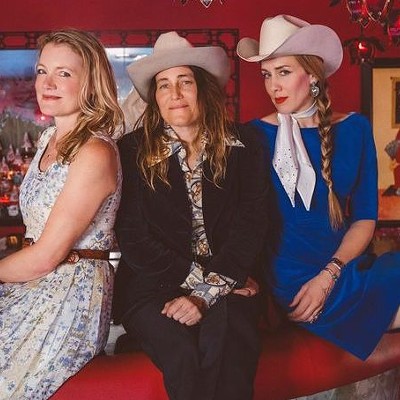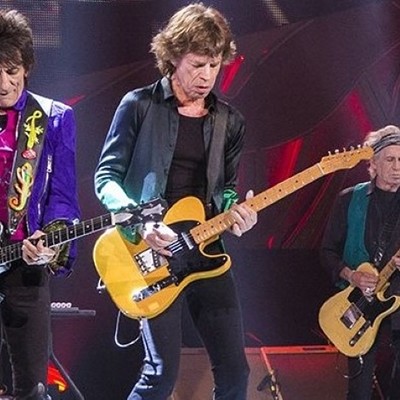Houston has a reputation for and kindness toward some music genres more than others. Blues, blues-rock, rap, metal, country and even psychedelia have all flourished in various clubs both still running and long-defunct across the city and its outskirts.
But the Bayou City has never quite cottoned to progressive rock bands, and especially those playing original tunes full of complex movements, multiple instruments, lyrics dealing with space and time, and tunes running in the ten-plus minute range.
In the late '70s, though, one local band of proggers who had paid their dues for nearly a decade seemed poised for a breakthrough; just one more gig, one more demo, one more audition before things could get really, really better. And then -- just like so many other bands before and after them -- Chameleon imploded.
"We had just done some demos at studios and were putting together an album project, and our producer had contacts at Epic Records. Things were looking good," says vocalist/keyboardist Craig Gysler today. "I felt strongest at this point, and we were going to move forward. And then, things started falling apart."
"We were in a quandary," adds vocalist/guitarist Spencer Clark via email from his home in California. "We were out playing two-third covers and one-third originals and making pretty decent money. But we held on to the dream of being a successful original music band...but everyone was tired of the same old stuff, and not getting the big break."
While Chameleon may have called it quits in 1980, the fine 2013 compilation Chameleon Rising (ShroomAngel Records) showcases them at their best from different studio sessions recorded throughout the '70s. And if the former members have their way, this lizard may get to lick again soon.
The story of Chameleon begins in 1969 when Mike Huey (drums) introduced fellow Lee High School student Clark to his older brother, Rick (vocals/bass). The three started a garage band called Evolepoh (read it backwards). When Huey transferred to Lamar High School, he met Gysler. And the now quartet rechristened themselves Lorien, with a sound more akin CSN than ELP.
"We had our first session at Mike's mom's house in the living room, and it was awesome. The piano sounded amazing in our music," Clark recalls. "And then it just snowballed."
Soon, though, the group began listening to more of the progressive rock of the era like early Genesis, Yes, King Crimson, and Emerson, Lake and Palmer. Agreeing to a shift in musical direction, Chameleon was born in 1972.
"In 1970, we discovered the album In the Court of the Crimson King, and obviously we were blown away by its majesty and sophistication," Rick Huey recalls. "At the time, although we loved the music, we still didn't have the chops to go there yet."
"We practiced constantly, writing music, and learning some cover tunes to get us by at gigs," Clark continues. "We had an affinity for our own music and, for whatever reason, Craig and I always wrote music that leaned on prog rather than hard rock, so that's what we built on."
Soon, the band was getting steady gigs as openers for bigger national acts like the MC5, Captain Beefheart, and Ted Nugent and the Amboy Dukes. They were also regulars a long-gone Houston clubs (often in converted houses) like Damien's, Catacombs, Love Street, Carnaby's, Rounds, and Grand Central.
Rick Huey says that in the summer of '73, Chameleon landed a gig as the house band at the Red Dog Saloon. They played five nights a week, with lots of covers of Led Zeppelin, the Who, Argent, and Trapeze, while also slowly introducing originals. Their audiences seemed to dig the music, even if it was a bit more demanding to experience.
"We always had a crowd, and they weren't there to boogie, they would listen," Gysler says. "And the show kept everybody occupied, with the music and the effects."
Some of those stage effects would include lights, dry ice, costumes, theatrics, and flashpots, the last of which caused one club to ban them when one explosion during a Chameleon show blackened the ceiling.
"We also used flash powder and gun powder, which made a nice 5-foot column of fire," Huey says. "The first night we used the flash powder at Damien's, the club filled up with so much white smoke the place had to empty for 45 minutes. Needless to say, we only used the smokeless gunpowder at Damien's after that!"
The band also had a "Mirror Ball Man" who would pounce around stage in a sparking jumpsuit, his body flailing under and shiny domed head.
While the band had their vision, it was still a challenge to get some bookings. Clubowners were more interested in covers than originals, and then more hard-rock and blues-rock bands than proggers.
"When we got bookings, they didn't pay much money," Clark says. "Those clubowners were raping the poor original bands. But hey, we got to play to crowds that actually kind of listened and more than not liked the music."
Gysler adds the band was always trying to balance their artistic ambitions with live-gig realities.
"It was hard to find something radio friendly from a progressive music standpoint," he remembers. "ELP had 'Lucky Man' and Yes had 'Roundabout.' We were trying to find ways to stay commercial and be successful."
The band hooked up with the Brock Agency, which began getting them gigs around the state. Local radio stations KLOL and KRBE did live simulcasts of Chameleon shows. That was the good news. The bad news is that those gigs found more and more cover songs creeping into the set.
Story continues on the next page.
"I hated that," Clark says. "We started making some money, and you know everybody loves you when you play the songs they know. But I still believe, deep down, that doing that crap steals the soul of the band and unknowingly affects your original playing style."
As the '70s progressed, the original music of Chameleon got even more detailed an intricate. And according to Clark, Huey's free-form drumming - while original and pure - did not have the precise timing skills and technique that the music needed.
Enter Marty Naul. He had those skills in spades, and the drummer's previous gig with fellow proggers Ozz Knozz was over (though he continues to play with them today, along with the band Worhol). He gladly took the drum seat.
Clark says today that the decision wasn't easy to make, and that he still harbors regrets and doubts if it was correct. But he has nothing but praise for the second skin thumper who joined in 1978.
"Marty did bring a vibrant, new, and exciting sound to our music, so we decided to put one final effort into our original recordings," Clark - who also still plays and records today - says.
For his part, Naul was already familiar with the types of audience at Chameleon shows. "Back in those days, people weren't drinking as much as getting stoned, either in the parking lot or before a show," he says. "And they'd just sit back and listen."
Those songs on Chameleon Rising are known as "The Barn Tapes" because they were recorded at Clark's studio built on his mini ranch in Simonton. Those sessions produced one track - "Life Positions" that both Gysler and Naul feel showed the band at their absolute musical peak.
"There is so much to that song, and everybody worked on it," Naul says. "Recording it was rough and playing it live was almost impossible, so you had to be at the top of your game. We nailed it one night at the Texas Opry House, and that was the highlight for me."
By that time, Chameleon had been around close to a decade, and no closer to a breakthrough than before. They had ever considered relocating to L.A.. London or even Frankfurt for a new start.
But when Clark, who had a growing family, was offered an opportunity to move to Northern California, he took it, leaving in 1979. Chameleon tried to continue, auditioning other singers and guitarists, but it just wasn't the same. And the band called it quits for good in 1980.
The five members had little or no communication with each other for decades, as they pursued careers both in and out of music. The latter of which included runs with other bands, studio playing, music teaching, and song-pitching. For a brief stint, Gysler (who also pursued a career in country music) and Naul even worked together installing home security systems.
It was Naul who started the Chameleon rising again when he found a cassette of the Barn Sessions, and put up a audio video on YouTube for the song "Midnight Matinee." Ironically for the prog-rock band, it's one of their more pop-sounding efforts.
An out-of-the-blue email from Rich Patz of ShroomAngel records asked Naul if he had any more music, and soon he was reaching out to other band members, who raided their own closets, cupboards, garages and attics.
The usable music was cleaned up at Sound Arts recording studio (where the tapes were actually baked), and the result is the 13-track Chameleon Rising, which is available on CD Baby, iTunes and Amazon. There is plenty of bombast, spaciness, grooves, and expansive rock in tracks like "Texas Cyclone," "Pilot Thoughts," "Follow Your Love," "Everyday, Everyway" and "Mirkwood Forest."
This of course, begs the question: can Chameleon reunite for a one-off reunion gig? A tour? A new recording?
"If we do anything, it will be all five of us," Naul says. He has already worked some with Huey, his drumming predecessor, to see if they can play together. And he says they can.
Gysler too is hopeful, but says Clark's residency in California (and his winery business) presents a challenge in terms of the intense rehearsals that would be required to play the detailed prog-rock.
Though he does add that the advances in instrumental technology over the past 35 years means he wouldn't have to bring so many of his organs, keyboards and pianos on stage. Likewise the drums. But they'd still need some "serious real estate space" on stage.
"We have it in our hearts for sure, it's just working out the logistics," he says. "As you get older, time is your most valuable commodity. What's well spent, what's not well spent. We all have lives and daytime stuff and families, so we'd have to be pretty well prepared."
For his part, Clark -- who has played with the Hueys in recent years in a studio band called Noblerott -- is actually more decisive.
"The Chameleon Rising album and the band are again once more!" he writes. "But now with two amazing drummers!"
Like what you read? Or are we missing something? We'd love for you to join our team.
ROCKS OFF'S GREATEST HITS
The Ask Willie D Archives Six Types of People You Might Meet at a Guitar Store Could Houston Ever Have a Great Music Scene? 10 Houston Acts to See Before You Can't Houston's 10 Coolest Bar Names
Follow @hprocksoff






